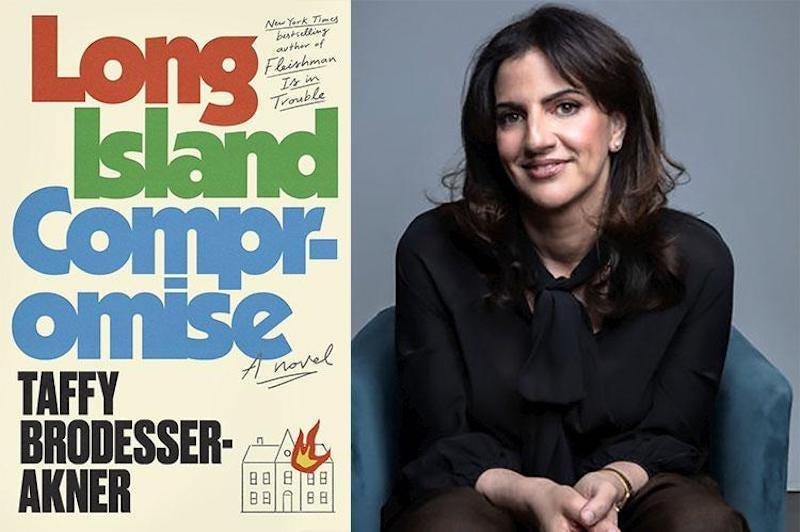Why I didn't finish 'Long Island Compromise'
The new novel from the author of 'Fleishman Is in Trouble' has too little of its wit
An obvious conflict-of-interest at the New York Times made me wary one of the six books on its Editors’ Choice list last week: Long Island Compromise, the second novel by Tammy Brodesser-Akner, a writer for the New York Times Magazine.
But I’d read Brodesser-Akner’s first novel, Fleishman Is in Trouble. And while I found it slow and overwritten, it was witty enough that her work seemed worthy of a second look.
I picked up her new novel after reading an essay Brodesser-Akner wrote for the Times about the 1974 kidnapping of the wealthy Long Islander Jack Teich, whose abduction had inspired her new book. Her father knew Teich, and she seemed well positioned to tell a story related to his.
Long Island Compromise centers on the aftermath of the kidnapping of a rich North Shore businessman, Carl Fletcher, who reunites with his pregnant wife and two sons after his family pays a steep ransom for his release in 1980. Fletcher’s family members deny, ignore, or downplay the crime and are still living with its unresolved effects at his grandsons’ bar mitzvahs.
I found the first 10,000 or so words of that story to be heavy going. Long Island Compromise had some of the same problems I’d found in Fleishman Is in Trouble without its wit and sharp social commentary. It was also developing a theme perhaps overfamiliar in modern novels: Families hand down traumas like sepia-toned photos.
But good writers can make an old idea new, and novelists often need more than 10,000 words to hit their stride. To sBrodesser-Akner did, I also read the last 15,000 or so words of Long Island Compromise. They were worse than the early chapters, especially if words like “ginormously” might test your patience more than Finnegans Wake.
I agreed with the downbeat conclusion drawn by Sam Sacks, the fiction critic of the Wall Street Journal, whose tastes tend to dovetail with mine. Sacks noted that the novel has a subplot that nods to the HBO hit “Succession”:
“Explicitly and implicitly, the novel likens itself to prestige TV: in its episodic structure, its over-the-top melodrama, its frequent complicated back stories and its disregard for plausibility.
“Maybe it’s this ironic awareness of pop-culture formulas that makes the final sections of Long Island Compromise so insufferable. Here the mad-capped, if fatiguing, fun is traded for semiserious therapeutic breakthroughs and life lessons. Trauma is of course the culprit, and each character comes to a startling realization of the way he or she was damaged by the kidnapping. As the epiphanies are churned out, you can almost hear the writing-room directive to start delivering some emotional vulnerability, dammit.”
Sacks mentioned a freeze-dried life lesson served up by the novel:
“The tide pool you’re born into is only manageable if someone gives you swimming lessons.”
That passage rang false for a reason that went beyond any cited by Sacks. I’ve known tide pools from Cape Cod to the Gulf of Mexico, and you couldn’t swim in any of them. They’re too murky, shallow, or full of seaweed. Swimming lessons in one? Yuck.
By then I’d read more than 25,000 words of Long Island Compromise and gave up on it.
Perhaps I’d have persisted if I hadn’t finished Fleishman Is in Trouble. But between that and Long Island Compromise, I’d read an estimated 100,000 of Brodesser-Akner’s words. That’s a fair test of any author’s work, wouldn’t you say?
Jan is an award-winning critic and journalist who has been the book columnist for Glamour, the book editor of a large newspaper, and a vice president of the National Book Critics Circle. She has written for the New York Times and other national media.




